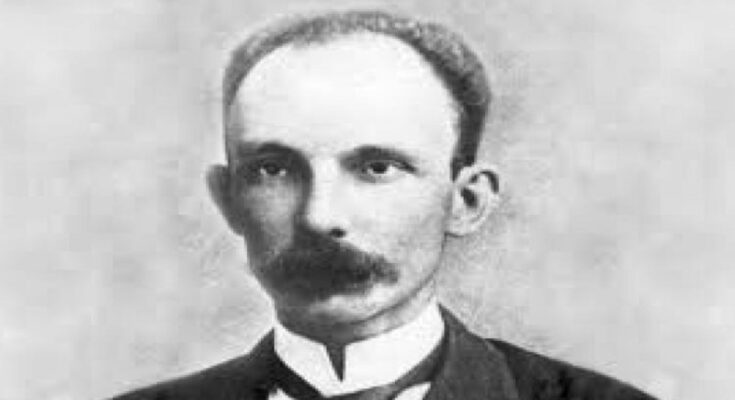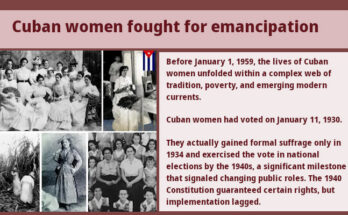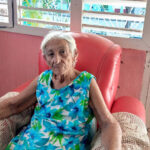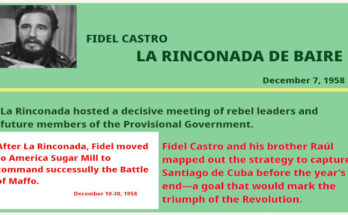In the journey from Cajobabo to Dos Ríos José Martí mentions more than once the Contramaestre River, narrating his pilgrimage through these then narrow areas. The people from Contramaestre feel a double commitment to be faithful to Martí’s legacy: for all that he meant to the homeland, as well as for his presence in part of our municipal territory.
Following are passages that speak of the Apostle’s passage through what is today the municipality of Contramaestre:
“To beyond, in the same crossing, to less muddy house. Miró leaves with his people. We arrive soon. To Rosalío Pacheco; who served in all the war, and was deported to Spain in the (Guerra) Chiquita (Little War); and there he married an Andalusian, Gómez reciprocally rebukes him.- Pacheco suffers, seated on the stretcher of rods at the foot of my hammock.
“From La Travesía to La Jatía, through the pastures, still rich in cattle, of La Travesía, Guayacanes and La Vuelta. The grass is already thickening with the continuous rain. Great pasture and field for horses. The wire fences must be pulled down, and the cattle opened to the mountain, or the Spaniard will take them, when he sets up camp at La Vuelta, at the crossroads of all these roads. With ravines like those of the Cauto, the Contramaestre appears, thinner and clearer; and then we cross it and drink. We talk about children: with his three sons is Teodosio Rodriguez, from Holguin: Artigas brings his own: with his two sons, 21 and 18 years old, comes Bellito. A cow passes quickly, mooing painfully, and jumps the fence: slowly comes to her, as if seeing little, the lost calf; and suddenly, as if it recognized her, it raises and comes up to her, with its tail in the air, and puts itself to the udder: even the mother mooses: La Jatía is a good house, of cedar, and of zinc runner, already abandoned of Agustín Maysana, rich Spanish; of letters and papers the floors are full. I write to the air, to Camagüey, all the letters that Calunga is going to carry, saying what has been seen, announcing the trip, to the Marquis, to Mola, to Montejo – I write the circular prohibiting the passage of cattle, and the letter to Rabí. Masó is in the savannah with Maceo, and we write to him: we have to stay here for a week, waiting for him. Three veterans from Las Villas come, one with three bullets in the reckless attack on Arimao, under Mariano Torres,-and his brother, to save him, with one: they go to Jiguaní for shopping and news: Jiguaní has a good fort, outside the town, and in the square two masonry drums, and the other two are unfinished, because the carpenters who worked on the wood have disappeared: and so they say: “see how these countrymen are, they don’t even want to stay with us when they are paid for it. When we went to bed, from the hammocks, after banana and cheese, and finished writing, we talked about Rosalío’s house, where we had been in the morning, to the café where he was waiting for us, with his arms on the fence. The man is stout and virile, of rough work, and handsome, with a rugged white face and a black beard, “Here you have me, madam,” says the faithful husband, and proudly: “And there she is in her purple tunic, her stockingless foot in her flowered slipper, the pretty Andalusian woman, perched on a stool, drinking her coffee. In a helmet her hair is raised behind her, and from there it hangs in a cauda: you can see her smile and sorrow. She does not want to go to Guantánamo, with Rosalío’s sisters: she wants to be “where Rosalío is”. The eldest daughter, white, of pure oval, with her short rich hair open in two and tangled, she stills a bony little creature, with the neck of thread and the hanging head, in a little lace cap: it is the last childbirth. Rosalío raised the farm; he has cows, presses cheese: by the pound we eat his cheese, soaked in coffee: with the teapot, on his stool, Rosalío gives milk to an angel of a son, naked, who bites the brothers who want to approach the father: Emilia, on tiptoe, takes a cup out of the cupboard she has made of drawers, against the wall of the ranch. Or she hears us sitting; with her painful smile, and all around her, her children hang around her.”
“We will wait for Masó in a less open place, near Rosalío, at his brother’s house. I am calming down: Bellito, Pacheco, and at the same time preventing them from showing me too much affection. We go back to yesterday’s pastures, we continue up the Cauto, and Bellito picks up his spurs to show me the beautiful stirrup, of thick greenery, where, with a wide bend in front of it, the two rivers meet: the Contramaestre enters the Cauto there. There in that abutment, which overlooks the pastures of the Travesía, Bellito has had a camp: a good camp: there is a dark grove of trees and a large ceiba tree. We crossed the Contramaestre, and shortly after, we alighted at the abandoned ranches of Pacheco. Here, when this was a mountain, was the camp of Los Ríos, where O’Kelly first met the insurrectionists, before going to Céspedes, and we talked about the three Altagracias – Altagracia la Cubana, where we were – Altagracia de Manduley – Altagracia la Bayamesa. Of hats: “so much weaver that there is in Holguí” – Of Holguín, that is dry land, that drinks the rain, with its houses to string, and its big patios, “there are thousand cows calved in Holguín” – They look for bramble leaves to me, or of tomato, to smear them of tallow, on the born ones. Artigas takes bangs off the jáquima that Bellito brings me – The ranch is already swept: hammocks, writing; reading; rain; restless sleep”.
Martí, in La Venta, current district of Contramaestre
“A guerrilla leaves for La Venta, the hamlet with Rebentoso’s tent, and the fort of 25 men. They send, hours later, the mayor; the Galician José González, married in the country, who says he is mayor by force, and waits at the ranch of Miguel Pérez, the pardo who is here as caretaker, barber. I write, little and badly, because I am thinking with anxiety and bitterness: to what extent will my desistance be useful to my country? And I must desist, as soon as: the proper time comes, to have the freedom to advise, and the moral power to resist the danger that I foresee for years, and in the solitude in which I go, perhaps it will prevail, because of the disorganization and lack of communication that in my isolation I cannot overcome, although, in the open field; the revolution would naturally enter, by its unity of soul, in the forms that would assure and accelerate its triumph. Rosalío comes and goes, bringing messages, milk, silverware, dishes: he is already the prefect of Dos Ríos. His Andalusian woman prepares a fig purge for a sick man, makes him a hammock from a cot, arranges a suit for him: the sick man is José Gómez, from Granada, smiling, with frank teeth: “And you, Gómez, how did you come here? Tell me, since you came to Cuba”. “Well, I came two years ago and I was demoted, and I stayed working in Camagüey. They reduced all of us in this way, to collect our wages, and we lived on what we worked for. I saw only Creoles, who treated me very well: I always dressed well, and I earned money, and I had friends: of my pay in two years, I only got twelve pesos: and now they called me to the barracks, and I did not suffer as much as others, because they made me a corporal; but that was mistreating the men, and I could not suffer it, and when an officer hit me twice, I shut up, and told myself that they would not hit me anymore, and I took the rifle and the capsules, and here I am”. And on horseback, in his jipijapa and brown coat, with his rifle by the saddle of his filly, and always smiling, the rafters who came from La Sabana, from Hato del Medio, to the ranch to ask if they could gather the wood: they return to Cauto del Embarcadero, but not to gather it: forbidden, the works that give benefit, direct or indirect, to the enemy. They do not murmur: they wanted to know: they are ready to leave; with Commander Contiño: I see coming, on horseback, at a serene pace under the rain, a magnificent man, black in color, with a large brimmed hat, who stands listening, behind the group, and with his head above him. It is Casiano Leyva, neighbor of Rosalío, practical for Guamo, among the triumphant the first, with his powerful axe: and when uncovered I see his noble face, high and fugitive forehead, cambered to the middle, meek and firm eyes, of great basin; between wide cheekbones; pure nose; and towards the sharp beard the gray pear: it is heroic the body box, raised in the thin legs: a bullet, in the leg: he carries permission to give meat to the neighborhood; so that they do not kill too much cattle. He speaks softly; and all he does has intelligence and majesty. He will then go by Guamo.- I write general instructions to the Gefes and Officers.”
Martí and Contramaestre waters
“The night rain, the mud, the bath in the Contramaestre: the caress of the running water: the silk of the water. In the afternoon; the guerrillas come: Masó is in the Sabana, and they are looking for him: they bring a convoy taken from La Ratonera. They empty it at the door: Bellito distributes it: they bring cloths, which Bellito measures by the arm: so much to the escort,-so much to Pacheco, the Captain of the convoy, and Bellito’s people,-so much to the General Staff: candles, a piece for Rosalío’s wife, onions and garlic and potatoes and olives for Valentín. When the convoy arrived, Valentin was the first, at the foot, as if opening anxiously. Then, the people all around. To them, a gallon of “vino de composición para tabaco”, – bad sweet wine: that the convoy from Bayamo, still without bothering Baire, handing out rations. It carries eleven pilots, and Francisco Diéguez among them: “But he will come: he has written to me: what happens is that in the force we had the bandits that he chased, and he does not want to come, the bandits of El Brujito, the dead man of Hato del Medio” – And there are no forces around with which to leave the convoy, which goes with 500 men. Rabí,” they say, “attacked the train from Cuba in San Luis, and stayed there.”
“Gómez leaves, with the 40 horses to bother the convoy at Bayamo. I stay writing with Garriga and Feria, who copy the General Instructions to the Chiefs and Officers with me twelve men, under Lieutenant Chacon, with three guards, to the three roads; and next to me, Graciano Perez. Rosalío, in his arrenquín, with the mud at his knees, brings me, in his jaba from home, the affectionate lunch: “for you I give my life”. They come, just out of Santiago, two brothers Chacón, owner of the arria taken the day before yesterday, and his blond brother, bachelor and comedian,- and José Cabrera, shoemaker of Jiguaní, tough and frank,- and Duane, young black, and as carved, in shirt, pants and big belt, and …. Avalos, shy, and Rafael Vázquez, and Desiderio Soler, 16 years old, whom Chacón brings as a son, and another son, Ezequiel Morales, 18 years old, whose father died in the war. And those who come, tell me about Rosa Moreno, the widowed peasant woman who sent her only son Melesio, 16 years old, to Rabí: “your father died there: I can’t go: you go”. They roast plantains, and grind cow jerky, with a stone in the pestle, for the newcomers. The water from the Contramaestre is very cloudy, and Valentín brings me a jar boiled in sweet water, with fig leaves”.
This is how José Martí came across the territory of the current Contramaestre municipality.




